Cannes Critic’s Take: A Cronenberg and Coppola Rematch?

- Oops!Something went wrong.Please try again later.
- Oops!Something went wrong.Please try again later.
- Oops!Something went wrong.Please try again later.
- Oops!Something went wrong.Please try again later.
- Oops!Something went wrong.Please try again later.
- Oops!Something went wrong.Please try again later.
- Oops!Something went wrong.Please try again later.
Writing in this space in 2015, TheWrap’s Alonso Duralde likened the Cannes Film Festival to the anti-Comic-Con: a kind of One For Them/One For Me point of exchange where promising stars could cash in franchise loyalty for a shot at prestige. Our critic was spot-on then and all the more prescient now: How else could one describe a 77th edition that might turn a superhero soldier into an awards darling on the strength of a certain hot-button political biopic?
How else, of course, but a thousand other ways? Because Cannes never holds a single form. To crib from a recent best picture, the festival is everything everywhere all at once. It’s a protean, perpetual motion machine in constant conversation with the film world and with its own legend and ever alive with possibilities.
From that prism, let’s start with Ali Abbasi’s portrait of Republican presidential nominee Donald Trump. Could “The Apprentice,” starring Sebastian Stan and Jeremy Strong, break out in a heated election year with a jury led by a California-raised pop-culture virtuoso? “Fahrenheit 9/11” director Michael Moore scored with those exact cards precisely 20 years ago, and who’s to say that same hand can’t win again?
Indeed, jury president Greta Gerwig might follow in the footsteps of 2004 predecessor Quentin Tarantino and use the Palme d’Or as a tool for protest — though, given the outcome of that year’s election, which was won by the guy Moore’s movie skewered, one with admittedly limited electoral sway. Or she could view the title “Oscar winner Justine Triet” as an invitation to send another international auteur down a gilded awards season path. (Could that be “Emilia Perez” director Jacques Audiard or maybe “The Girl with the Needle” star Trine Dyrholm?) But if Gerwig wants to trace the prize’s most lasting effect, she need only ask “The Shrouds” director David Cronenberg, who chaired the jury in 1999.
Few decisions have left a more seismic impact on the global film landscape than Cronenberg’s choice to snub frontrunner Pedro Almodóvar’s “All About My Mother” in favor of “Rosetta” from two relatively little-known siblings from Belgium. If the Dardenne brothers’ (first) Palme d’Or was controversial at the time, the accolades feel commonplace now — especially after a quarter century that has seen their brand of grim naturalism become the lingua franca of international art cinema. Perhaps a new 25-year-cycle begins this year.
Or maybe the jurors honor one of their own. Returning to the competition for his seventh time, David Cronenberg has yet to claim the top prize. He nearly touched gold with “Crash” in 1996, before himself running headlong into a jury president with impressive veto power. What’s more, Cronenberg the director has never seemed more significant, with the macabre maestro’s influence felt across Neon and A24’s release slates, to say nothing of 2021 Palme d’Or winner “Titane.”
A prize for Cronenberg’s deeply personal “The Shrouds” would be a capstone on a remarkable career. But on the lifetime achievement front, Cronenberg might encounter the very same man who reputedly denied him in 1996. For who else chaired that year’s jury than Mr. Francis Ford Coppola? And on the career-honoring front, the only thing more impressive than a first Palme d’Or is a third.
Coppola won his first Palme for 1974’s “The Conversation,” a kind of palate cleanser he undertook in between back-to-back Oscars for “The Godfather” films. In doing so, he elevated the One-for-Them/One-for-Me dialectic to operatic highs never seen before or since.
That is, at least until now. This year he returns with perhaps the most ambitious One for Me in film history: “Megalopolis,” a nine-figure folly Coppola funded himself and that (at least as of press time) has yet to find backing from the Hollywood studios that are the Thems in this equation. Suffice it to say an award for the film would be a blunt statement, tipping the scales in an unambiguous direction.
Cannes might be a far cry from Comic-Con, but by celebrating George Lucas and Studio Ghibli with honorary Palmes, the festival is hardly averse to big-screen showmen from all over the globe. On the blockbuster front, Hollywood epics from George Miller (“Furiosa: A Mad Max Saga”) and Kevin Costner (“Horizon, An American Saga”) will screen alongside Peter Chan’s “She’s Got No Name” — a title that could end up the year’s absolute biggest sensation once you factor in ticket sales from just the Middle Kingdom. On the competition front, we can look forward to a Greek auteur’s latest provocation with his American muse (Yorgos Lanthimos’ “Kinds of Kindness,” starring Emma Stone), or to the first Indian film to crack the Palme d’Or race in more than three decades (Payal Kapadia’s “All We Imagine as Light”).
If far from perfect, the world’s biggest festival remains a place for discovery — the only international crossroads that can turn a South Korean thriller like “Parasite” into a global sensation. For that reason, Cannes goes beyond the Them/Me dichotomy; for film fans, it’s a place for Us.
The post Cannes Critic’s Take: A Cronenberg and Coppola Rematch? appeared first on TheWrap.

